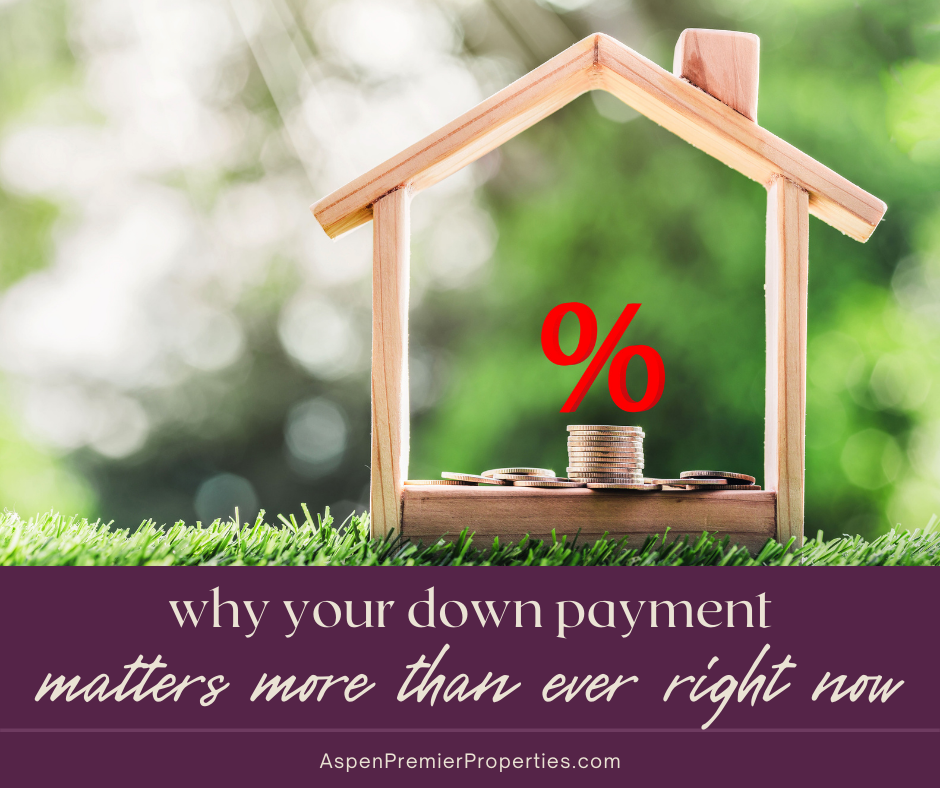
Does your down payment matter? If it does, how big an impact will it make on your monthly payments, interest rate and other costs? This guide explains.
When you’re buying a home in Aspen, it’s a great idea to use the equity in your current home as a down payment – and then add to that the amount you have in savings. The higher your down payment is, the lower your monthly mortgage payments will be. Additionally, you’ll likely get better terms and rates on your new mortgage loan with a higher down payment. Finally, if you put down less than 20 percent as a down payment, your lender will most likely require you to pay for private mortgage insurance (unless you take out certain types of loans that don’t require it or that prohibit it).
That’s all common sense, right?
But for many people, it’s helpful to see the numbers broken down. Here’s a quick look at what a higher down payment could mean for you.
Why Your Down Payment Matters
Take a look at the numbers in the table below, which outline different scenarios when you purchase a $900,000 house or condominium with a 30-year, fixed-rate mortgage at 3.615 percent interest.
| Down Payment | Amount Financed | Interest Rate | Monthly Payments |
| $0 | $900,000 | 3.615% | $4,099 |
| $25,000 | $875,000 | 3.615% | $3,986 |
| $50,000 | $850,000 | 3.615% | $3,872 |
| $75,000 | $825,000 | 3.615% | $3,758 |
| $100,000 | $800,000 | 3.615% | $3,644 |
| $125,000 | $775,000 | 3.615% | $3,530 |
| $150,000 | $750,000 | 3.615% | $3,416 |
Seeing the numbers laid out – and the nearly $700-per-month difference between putting nothing down and putting down $150,000 – can make a huge difference over time. In fact, over 30 years, that difference ($683 per month) amounts to exactly $245,880 more in your pocket.
Though these calculations use 3.615 percent interest, your interest rate will vary based on several factors, including your credit score, the current market’s fluctuations and the amount of money you put down. (That means if you put down a higher down payment, you may qualify for a lower interest rate.)
This table doesn’t account for adjustable-rate mortgages, either. With an adjustable-rate mortgage, you may qualify for a significantly lower interest rate during your introductory period (say 3, 5, 7 or 10 years); then, your interest rate is subject to changes in the market each year. Typically, there’s an interest rate cap in place that prevents your interest from going over a certain percentage, as well.
Related: Should you buy a vacation home in Aspen this year?
Why You May Want to Use Equity for a Down Payment Right Now
The real estate market in Aspen is moving quickly, and many homes have appreciated significantly in value over the past few years. It’s simple supply and demand; there are fewer homes than there are buyers, which means prices go up.
That means that your house may be worth more – a lot more – than you think it is. Now is a great time to contact an Aspen REALTOR® to discuss your home’s value and determine just how much equity you’ve built in it over the time you’ve owned it. Call our office today for a free comparative market analysis so we can let you know what buyers are most likely willing to pay for your home on today’s market.
Related: 7 red flags that should send you running when you look at homes for sale
Are You Selling or Buying a Home in Aspen?
If you’re ready to sell your home in Aspen, Woody Creek, Basalt, Carbondale or Snowmass, we may be able to help you.
Get in touch with us right now to find out how much your home is worth – and discover how we’ll be able to help you sell it quickly and for top dollar.
If you’re also looking for a home for sale in Aspen or a nearby community, check out our listings by price:
- $200k to $300k
- $300k to $400k
- $400k to $500k
- $500k to $600k
- $600k to $700k
- $700k to $800k
- $800k to $900k
- $900k to $1 million
- Over $1 million





























